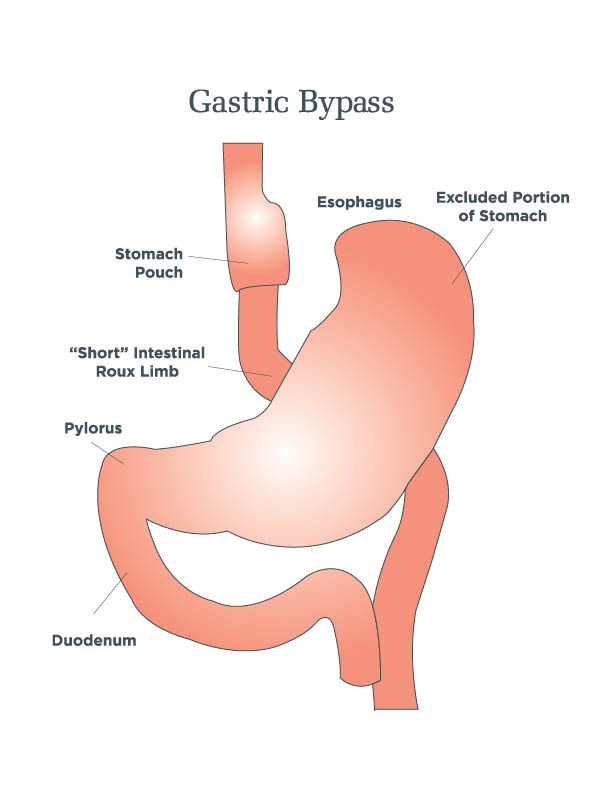
The gastric bypass procedure divides the stomach into two unequal parts. The top part, now called "the pouch," is only about the size of an egg. The rest of the stomach becomes called "the bypassed stomach," or "excluded stomach" because food and drinks no longer enter it. The bypassed stomach is not removed, and still makes stomach enzymes and juices.
Once the pouch has been created, food comes in at the top, and then leaves the pouch through a small opening called the “stoma," and travels into the intestines where digestion can take place. The juices from the bypassed stomach travel down a different part of the intestines, and ultimately are mixed with the food. No part of the stomach or intestines is removed.
How it Works
There are four effects: restriction, dumping, reduced appetite and malabsorption. Every individual undergoing gastric bypass experiences different degrees of each effect. All of these effects work together to help you drastically reduce the calories coming into your body.
Restriction
The small pouch and stoma make you fill up on much less food. For the first few months after surgery, this may be only about a quarter of a cup. As time goes on, people can usually eat about a cup of food.
Dumping
The intestines are much more sensitive than the stomach, and this can cause unpleasant reactions to certain types of food. Usually high-calorie foods, such as concentrated sugars and fats, are the type that cause problems. Dumping can include nausea, diarrhea, cramping and low blood sugar. These unpleasant side effects help you stay away from junk food.
Reduced Appetite
There is usually no hunger at all for the first few weeks to months after gastric bypass. Hunger may come back eventually for some people and not for others. If hunger does come back, it is usually less than before surgery and can be satisfied with much less food. Gastric bypass reduces a “hunger hormone” called ghrelin.
Malabsorption
After gastric bypass surgery, you may not digest all of the calories in the food you eat. This is a relatively minor effect of the surgery.
Gastric Bypass Advantages (compared to other bariatric operations)
- Somewhat higher average weight loss than sleeve gastrectomy or gastric band
- Best chance of controlling of GERD (acid reflux)
- Better chance of controlling diabetes than sleeve gastrectomy
- Reversal: although it is rarely done, a gastric bypass can be reversed
- Less risk of malabsorption problems than with “switch” procedures (SADI-S or BPD/DS)
Gastric Bypass Disadvantages
- More complex surgery than sleeve gastrectomy or gastric band
- Risk of a type of ulcer that cannot happen with sleeve gastrectomy, gastric band or switch operations (SADI-S or BPD/DS). These ulcers are rare if you abstain from tobacco products and NSAIDs (Non-steroidal anti-inflammatory drugs)
- Although still very uncommon, there is an increased risk of bowel obstruction (from internal hernia or adhesions) compared to the other bariatric operations

